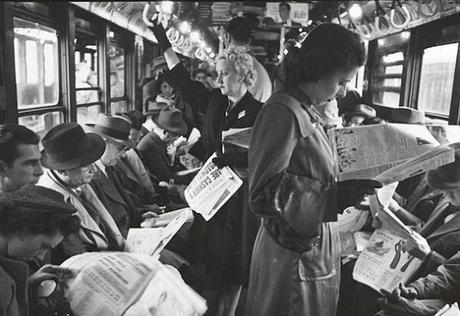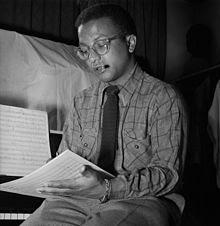
The A Train
Mercer recalled that he found the composition in a trash can after Strayhorn discarded a draft of it because it sounded too much like a Fletcher Henderson arrangement. The song was first recorded on January 15, 1941 as a standard transcription for radio broadcast. The first (and most famous) commercial recording was made on February 15, 1941.I suppose one of the lessons to be drawn from this story is that writers should always be on the lookout for words or phrases that can be turned into material. I remember the origins of ‘The Third Man’:“I had paid my last farewell to Harry a week ago when his coffin was lowered into the frozen February ground, so that it was with incredulity that I saw him pass by without sign of recognition, among the host of strangers in the Strand.” That sentence was written on the flap of an envelope by Graham Greene.And I read this a couple of months ago:Paul Simon’s 1972 song ‘Mother and Child Reunion’ was a meditation on death that came about from the loss of a family pet. It was the first death he had ever experienced personally. He thought "Oh, man, what if that was (my wife) Peggy?" but the title came from when he was eating in a Chinese restaurant. There was a dish called Mother and Child Reunion. It’s chicken and eggs. He said, "I’ve got to use that title"Personally I prefer to have a notebook (with pen attached) handy in my pocket. I have hundreds of snaps of conversations overheard on trains or streets or cafes tucked away in dozens of notebooks hopefully to use as a title or a line in a poem but my favorite is:‘She was like a radioactive cucumber’. I have no idea where I heard that.

I was on a train when I wrote this with the title I’d scribbled at the time:
A Fashion Statement
There he was on the 10-35,
designer shades, designer stubble,
jacket with that certain style,
polo shirt in this year’s colour,
faded jeans and county shoes,
turning the pages of a glossy journal,
completely absorbed in his haute couture.
An hour or so and the train pulled in,
a small town, branch line station,
across the aisle and three seats down
the young man rose to leave
and as he passed I had to look,
check what sort of city world
his magazine was set in.
New York, Paris, New Look, chic,
London, What’s New, exquisite.
It was Wisden.
Wisden Cricketing Monthly.
I almost called him back,
called to apologize,
explain that labelling strangers
is just part of writing,
a note for later use
nothing personal
but by then he’d gone
and here it is, six months later,
scribbled in pencil
‘fashion victim, country train’
I hadn’t even changed it.
First published in Poetry Monthly in January 2007

Billy Strayhorn
Thanks for reading, Comments and feedback are welcoomed.Terry Q. Email ThisBlogThis!Share to TwitterShare to Facebook